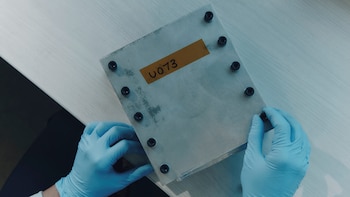
(ATR) The sporting world is readying itself to act on the new findings from Professor Richard McLaren’s report on Russia’s state-sponsored doping system.
Russian sport authorities and international actors remain in limbo, waiting for the new results found by World Anti-Doping Agency independent investigator McLaren. Without the true extent of findings in his report, international actors have struggled to reintegrate Russia into the sporting world. The Olympic family is also prepared for the potential need of further sanctions against Russia.
"I cannot speculate on the situation and results," Thomas Bach, IOC president, said today. "I think we have already shown our reaction on how we will deal with this report."
During the final IOC Executive Board meeting in 2016, the group extended the current sanctioning of Russian. The IOC "will not organize or give patronage" to any international sporting event in Russia. In addition, the IOC has urged the seven winter sports federations to avoid staging competitions in Russia.
Two IOC commissions have been set up to investigate the findings presented by McLaren. One, now chaired by former Swiss president Samuel Schmid, is serving as an Inquiry commission into allegations of Russian state officials aiding the doping system. The other, chaired by IOC member Denis Oswald, is serving as a disciplinary commission re-analyzing samples from the Sochi 2014 Olympics.
"As soon as we have the [McLaren] report, it will be handed to the two commissions who have already made preparatory work," Bach said. "There is a wide range of possibilities and then it is in the hands of the two commissions. But the commissions have to go beyond the report of McLaren with his cooperation."
In addition, the Russian Anti-Doping Agency (RUSADA) remains suspended by WADA, and the All-Russia Athletics Federation (ARAF) is currently suspended by the International Association of Athletics Federations. Both WADA and the IAAF will review the findings from the second McLaren report while working to reintegrate Russia.
The IAAF task force working with ARAF says there is currently no timeline for lifting the suspension of the federation. Until ARAF’s suspension is lifted, no Russian athlete can compete in an international athletics competition. Among the requirements for the reinstatement of ARAF are a functioning RUSADA and compliance with the WADA code.
WADA continues to work with RUSADA and Russian authorities to get the country in line with the body’s code. At the recent WADA Foundation Board meeting, some members were surprised with the rhetoric IOC member from Russia Vitaly Smirnov used to describe the situation. Smirnov denied that Russia has a state-sponsored doping system, saying the entire anti-doping community must "fight this evil together."
Robin Koehler, the WADA official in charge of monitoring Russia’s progress, said at the Foundation Board meeting that the country is making progress to meet the WADA code but problems remain. Koehler said anti-doping officials still have issues getting physical access to athletes and previous anti-doping tests.
Bach says, in his opinion, the report could lead to revisiting the 2007 Osaka rule, which prevented athletes suspended for over six months from participating in the next edition of the Olympic Games. The rule was struck down by the Court for Arbitration of Sport in 2011.
"Clearly, for me, if an athlete or an official would be part of such a system, I would not like to see this person again at any Olympic Games in any official capacity," Bach said. "This for me would present such aggravating circumstances that the logical consequence would be a life ban and an exclusion from the Olympics for life."
Written by Aaron Bauer
25 Years at #1: Your best source of news about the Olympics is AroundTheRings.com, for subscribers only.
What's the world's best sport city? Vote here!
Últimas Noticias
Utah’s Olympic venues an integral part of the equation as Salt Lake City seeks a Winter Games encore
Utah Olympic Legacy Foundation chief of sport development Luke Bodensteiner says there is a “real urgency to make this happen in 2030”. He discusses the mission of the non-profit organization, the legacy from the 2002 Winter Games and future ambitions.

IOC president tells Olympic Movement “we will again have safe and secure Olympic Games” in Beijing
Thomas Bach, in an open letter on Friday, also thanked stakeholders for their “unprecedented” efforts to make Tokyo 2020 a success despite the pandemic.

Boxing’s place in the Olympics remains in peril as IOC still unhappy with the state of AIBA’s reform efforts
The IOC says issues concerning governance, finance, and refereeing and judging must be sorted out to its satisfaction. AIBA says it’s confident that will happen and the federation will be reinstated.

IOC president details Olympic community efforts to get Afghans out of danger after Taliban return to power
Thomas Bach says the Afghanistan NOC remains under IOC recognition, noting that the current leadership was democratically elected in 2019. But he says the IOC will be monitoring what happens in the future. The story had been revealed on August 31 in an article by Miguel Hernandez in Around the Rings

North Korea suspended by IOC for failing to participate in Tokyo though its athletes could still take part in Beijing 2022
Playbooks for Beijing 2022 will ”most likely” be released in October, according to IOC President Thomas Bach.




